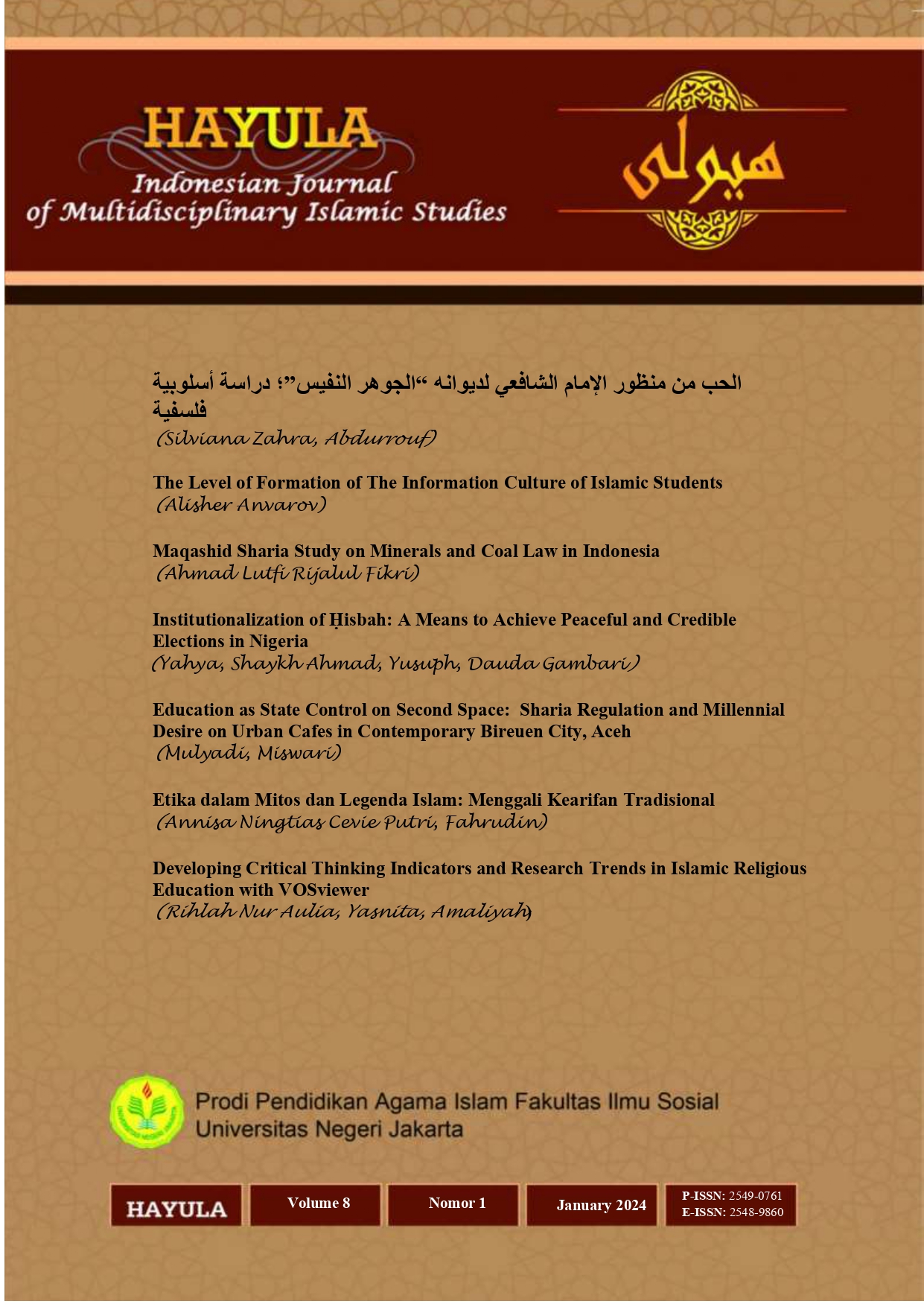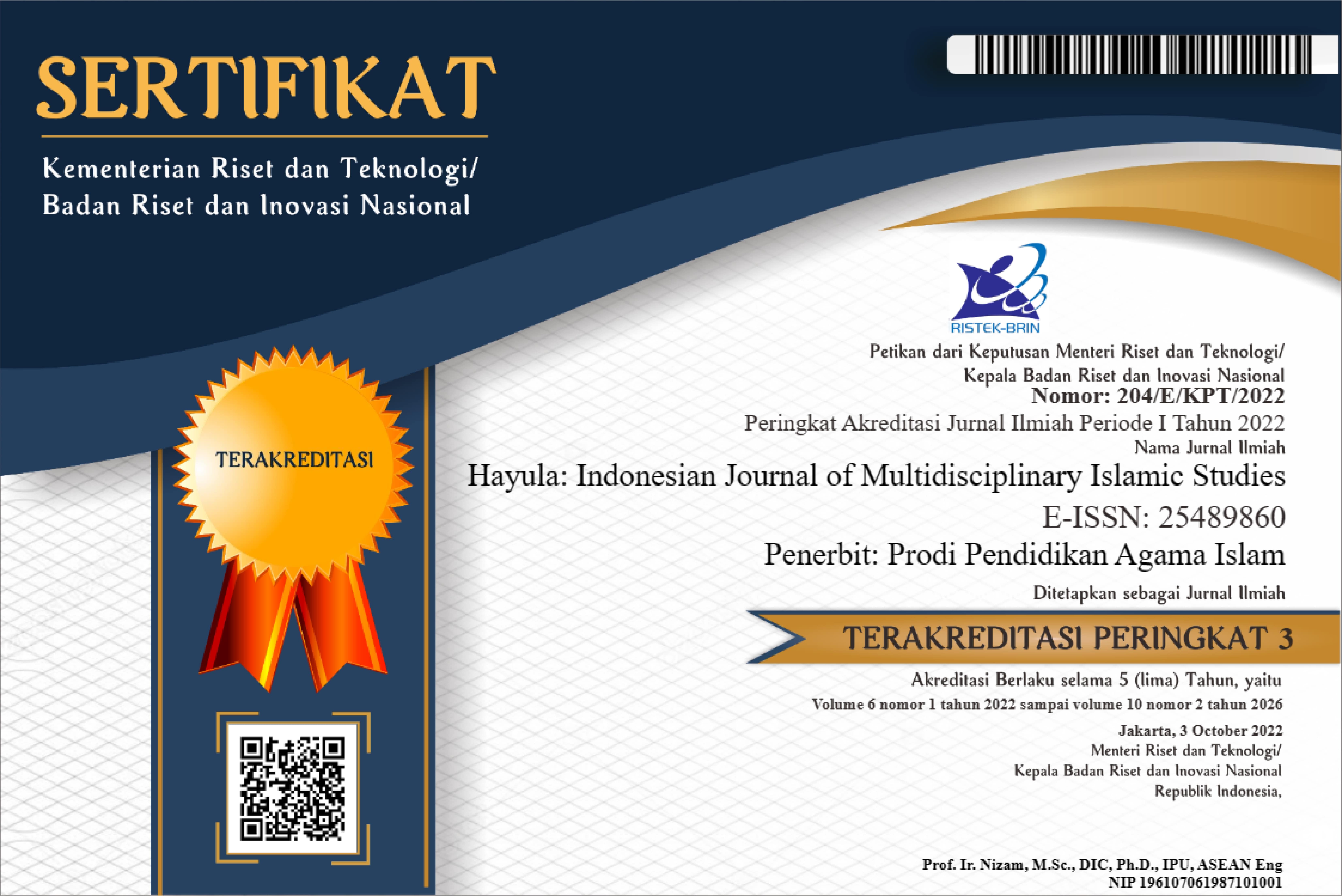Islamic Work Ethic: A Comparative Study on Generation Y and Generation Z
DOI:
https://doi.org/10.21009/hayula.009.01.04Keywords:
Comparative Studies, Islamic Work Ethic, Generation Y, Generation ZAbstract
Indonesia's Muslim fashion industry is growing rapidly, and the development of its organizational system based on Islamic values and ethics has been a basic guideline for organizational activities. However, the meaning of Islamic work ethics, which is the basis for employees to carry out every activity and influence employees' commitment, participation, and performance, may be different for employees belonging to Generation Z or employees belonging to Generation Y. Employees belonging to Generation Z are known as the instant generation and digital natives. Generation Y employees are known for their focus on personal and individualistic values. This can certainly show behavior with different meanings of Islamic work ethic. This research was conducted on 278 employees from companies that apply Islamic work culture using a quantitative descriptive method and convenience sampling. The data was collected online through Google Form and descriptive analysis was carried out to see the differences in Islamic Work Ethic between Generation Y and Generation Z. The results showed that there is no difference in the Islamic Work Ethic displayed by the employees despite being from different generations. However, there are differences in behavior and understanding of work ethics that can be used as a basis for companies to improve the work ethics of their employees.
References
Aflah, K. N., Suharnomo, S., Masud, F., & Mursid, A. (2021). Islamic Work Ethics and Employee Performance: The Role of Islamic Motivation, Affective Commitment, and Job Satisfaction. Journal of Asian Finance, Economics, and Business, 8(1). https://doi.org/10.13106/jafeb.2021.vol8.no1.997
Ali, A. (1988). Scaling an Islamic work ethic. Journal of Social Psychology, 128(5). https://doi.org/10.1080/00224545.1988.9922911
Ali, A. J., Al-Aali, A., & Al-Owaihan, A. (2013). Islamic Perspectives on Profit Maximization. Journal of Business Ethics, 117(3). https://doi.org/10.1007/s10551-012-1530-0
Ali, A. J., & Al-Owaihan, A. (2008). Islamic work ethic: A critical review. In Cross Cultural Management: An International Journal (Vol. 15, Issue 1). https://doi.org/10.1108/13527600810848791
Andrea, B., Gabriella, H. C., & Tímea, J. (2016). Y and Z generations at workplaces. Journal of Competitiveness, 8(3). https://doi.org/10.7441/joc.2016.03.06
Andreassen, C. S., Pallesen, S., & Griffiths, M. D. (2017). The relationship between addictive use of social media, narcissism, and self-esteem: Findings from a large national survey. Addictive Behaviors, 64, 287–293. https://doi.org/10.1016/j.addbeh.2016.03.006
Barhate, B., & Dirani, K. M. (2022). Career aspirations of generation Z: a systematic literature review. In European Journal of Training and Development (Vol. 46, Issues 1–2). https://doi.org/10.1108/EJTD-07-2020-0124
Benítez-Márquez, M. D., Sánchez-Teba, E. M., Bermúdez-González, G., & Núñez-Rydman, E. S. (2022). Generation Z Within the Workforce and in the Workplace: A Bibliometric Analysis. In Frontiers in Psychology (Vol. 12). https://doi.org/10.3389/fpsyg.2021.736820
Bergler, T. E. (2020). Generation Z and Spiritual Maturity. Christian Education Journal, 17(1). https://doi.org/10.1177/0739891320903058
Caniago, I., Yuliansyah, Y., Dewi, F. G., & Komalasari, A. (2023). Islamic work ethic in behavioral accounting. Journal of Islamic Accounting and Business Research. https://doi.org/10.1108/JIABR-05-2021-0152
Chillakuri, B. (2020). Understanding Generation Z expectations for effective onboarding. Journal of Organizational Change Management, 33(7). https://doi.org/10.1108/JOCM-02-2020-0058
Chupradit, S., Jasiyah, R., Alazzawi, F. J. I., Zaroni, A. N., Norvadewi, N., Mahmudiono, T., Sabit, S. H., Suksatan, W., & Bykanova, O. (2022). The impact of Islamic work ethics on organisational culture among Muslim staff. HTS Teologiese Studies / Theological Studies, 78(4). https://doi.org/10.4102/hts.v78i4.7332
Creswell, J. W. (2020). Penelitian Kualitatif & Desain Riset : Memilih di Antara Lima Pendekatan. In Mycological Research.
Dewi, C. A., Pahriah, P., & Purmadi, A. (2021). The Urgency of Digital Literacy for Generation Z Students in Chemistry Learning. International Journal of Emerging Technologies in Learning, 16(11). https://doi.org/10.3991/ijet.v16i11.19871
Djafarova, E., & Foots, S. (2022). Exploring ethical consumption of generation Z: theory of planned behaviour. Young Consumers, 23(3). https://doi.org/10.1108/YC-10-2021-1405
Ercömert, C., & Güneş, S. (2021). Industrial Design Education: A Research on Generation Theories and Change in Turkey. Design and Technology: An International Journal2, 26(3).
Goldstone, J. A. (2001). Toward a fourth generation of revolutionary theory. Annual Review of Political Science, 4. https://doi.org/10.1146/annurev.polisci.4.1.139
Grabinski, C. J. (1998). Cohorts of the Future. New Directions for Adult and Continuing Education, 1998(77). https://doi.org/10.1002/ace.7707
Hasan, R. R., Samdin, Nusantara, A. W., & Hatani, L. (2022). Moderating Role of Islamic Work Ethics on The Effect of Innovation and Entrepreneurship Orientation on Entrepreneurial Behavior and Business Performance. Quality - Access to Success, 23(188). https://doi.org/10.47750/QAS/23.188.36
Hendryadi, H. (2018). ISLAMIC WORK ETHICS (IWE). Jurnal Riset Manajemen Dan Bisnis (JRMB) Fakultas Ekonomi UNIAT, 3(2). https://doi.org/10.36226/jrmb.v3i2.111
Hodges, D. Z. (2019). Use generational theory as a guide to understanding college students. Dean and Provost, 21(3). https://doi.org/10.1002/dap.30653
Indonesia, D. (2022). Jumlah Penduduk Muslim Indonesia Terbesar di Dunia pada 2022. Data Indonesia. https://dataindonesia.id/varia/detail/populasi-muslim-indonesia-terbesar-di-dunia-pada-2022
Javed, S., Malik, A., & Alharbi, M. M. H. (2020). The relevance of leadership styles and Islamic work ethics in managerial effectiveness. PSU Research Review, 4(3). https://doi.org/10.1108/PRR-03-2019-0007
Kamaruddin, M. I. H., Auzair, S. M., Rahmat, M. M., & Muhamed, N. A. (2021). The mediating role of financial governance on the relationship between financial management, Islamic work ethic and accountability in Islamic social enterprise (ISE). Social Enterprise Journal, 17(3). https://doi.org/10.1108/SEJ-11-2020-0113
Kaplan, R. M., & Saccuzzo, D. P. (2017). Psychological Testing. Principles, Applications, & Issues. IDF Diabetes Atlas, 8th Edition.
Kar, S. (2018). Managing Generation Y Employees: HR Challenges and Opportunities. 104(July), Generation-Y employees, Generation X, Baby Boomer.
Kerlinger, F. N., & Lee, H. B. (2011). Foundations of Behavioral Research: The Most Sustainable Popular Textbook By Kerlinger & Lee (2000). Journal of Social Development, 13(2).
Kinash, S., & Crane, L. (2015). Enhancing graduate employability of the 21st century learner Proceedings of the International Mobile Learning Festival 2015 : International Mobile Learning Festival, 148–171.
Kiswara Rahmantya, Y. E., Salim, U., Djumahir, & Djazuli, A. (2019). Hospital’s competitive advantage through service quality, information systems and Islamic work ethics. Problems and Perspectives in Management, 17(2). https://doi.org/10.21511/ppm.17(2).2019.14
Kogan, M. (2001). Bridging the gap across the generation divide in the federal workplace. Government Executive, 33(12).
Kowske, B. J., Rasch, R., & Wiley, J. (2010). Millennials’ (lack of) attitude problem: An empirical examination of generational effects on work attitudes. Journal of Business and Psychology, 25(2), 265–279. https://doi.org/10.1007/s10869-010-9171-8
Nasution, F. N., & Rafiki, A. (2020). Islamic work ethics, organizational commitment and job satisfaction of Islamic banks in Indonesia. RAUSP Management Journal, 55(2). https://doi.org/10.1108/RAUSP-01-2019-0011
Peng, C. Y. J., Chen, L. T., Chiang, H. M., & Chiang, Y. C. (2013). The Impact of APA and AERA Guidelines on Effect Size Reporting. In Educational Psychology Review (Vol. 25, Issue 2). https://doi.org/10.1007/s10648-013-9218-2
Romi, M. V., Ahman, E., Disman, Suryadi, E., & Riswanto, A. (2020). Islamic work ethics-based organizational citizenship behavior to improve the job satisfaction and organizational commitment of higher education lecturers in Indonesia. International Journal of Higher Education, 9(2). https://doi.org/10.5430/ijhe.v9n2p78
Sireci, S. (2020). De-“Constructing” Test Validation. Chinese/English Journal of Educational Measurement and Evaluation, 1(1). https://doi.org/10.59863/ckhh8837
Stewart, J. S., Oliver, E. G., Cravens, K. S., & Oishi, S. (2017). Managing millennials: Embracing generational differences. Business Horizons, 60(1), 45–54. https://doi.org/10.1016/j.bushor.2016.08.011
Sugiono. (2014). Metode Penelitian Pendidikan: Pendekatan Kuantitatif, Kualitatif dan R&D. In Alfabeta Bandung.
Suryani, S., Sudrajat, B., Hendryadi, H., Saihu, M., Amalia, E., & Fathoni, M. A. (2023). Development of thriving at work and organizational citizenship behavior through Islamic work ethics and humble leadership. Asian Journal of Business Ethics, 12(1). https://doi.org/10.1007/s13520-022-00160-3
Udin, U., Dananjoyo, R., Shaikh, M., & Vio Linarta, D. (2022). Islamic Work Ethics, Affective Commitment, and Employee’s Performance in Family Business: Testing Their Relationships. SAGE Open, 12(1). https://doi.org/10.1177/21582440221085263
Downloads
Published
How to Cite
Issue
Section
License
Copyright (c) 2025 Anissa Lestari Kadiyono, AF Mirza Firmansyah (Author)

This work is licensed under a Creative Commons Attribution 4.0 International License.
Authors who publish with this Journal agree to the following terms:
- Author retain copyright and grant the journal right of first publication with the work simultaneously licensed under a creative commons attribution licensethat allow others to share the work within an acknowledgement of the work’s authorship and initial publication of this journal.
- Authors are able to enter into separate, additional contractual arrangementfor the non-exclusive distribution of the journal’s published version of the work (e.g. acknowledgement of its initial publication in this journal).
- Authors are permitted and encouraged to post their work online(e.g. in institutional repositories or on their websites) prior to and during the submission process, as it can lead to productive exchanges, as well as earlier and greater citation of published works.
Users/public use of this website will be licensed to CC BY







